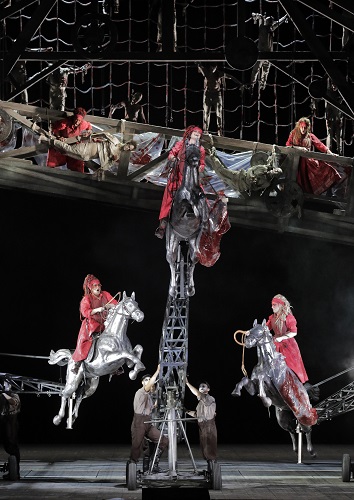 United States Wagner, Die Walküre: Soloists, Lyric Opera of Chicago / Sir Andrew Davis (conductor), Chicago, IL. 5.11.2017. (JLZ)
United States Wagner, Die Walküre: Soloists, Lyric Opera of Chicago / Sir Andrew Davis (conductor), Chicago, IL. 5.11.2017. (JLZ)

Cast:
Brünnhilde – Christine Goerke
Sieglinde – Elisabet Strid
Siegmund – Brandon Jovanovich
Wotan – Eric Owens
Fricka – Tanja Ariane Baumgartner
Hunding – Ain Anger
Production:
Conductor – Sir Andrew Davis
Director – David Pountney
Original Set Designer – Johan Engels
Set Designer – Robert Innes Hopkins
Costume Designer – Marie-Jeanne Lecca
Lighting Designer – Fabrice Kebour
Choreographer – Denni Sayers
Die Walküre, the second part of Lyric’s new production of Wagner’s Ring cycle, involves an international cast in a thoroughly engaging presentation. David Pountney offers a vivid steampunk conception, demonstrating an effective combination of technologies to create effects and to shape the stage.
Some of the more audacious aspects, like the famous ‘Ride of the Valkyries’, echo Zubin Mehta’s daring Ring cycle at Barcelona’s Liceu and similarly, make Pountney’s staging visually fresh. It was thrilling to see the airborne Valkyries taking delight, with the full-voiced splendor the music requires. The ‘Magic Fire’ also had a vivid effect, even if the technology surpassed the sometimes contrived attempt to create the magic described in the libretto. While much in Wagner’s mythological world is left to the imagination, Pountney deserves credit for exceeding expectations.
Similar to her memorable Cassandra in last season’s Les Troyens, Christine Goerke made a magnificent Brünnhilde. Goerke surpassed the notated demands of the score to create moving aural images, as in the second act’s Todesverkündigung (death announcement) in which she warns Siegmund about Wotan’s decision to let Hunding kill him for transgressing the marriage bond. Fully in command of the line, Goerke gave this critical scene the vocal and dramatic nuances it requires. In the final act, her duet with Eric Owens was touching, creating a humanely moving conclusion.
Elisabet Strid was captivating as Sieglinde, starting in the first act with her stylish love duet with her long-lost brother, and combined ringing tone with excellent diction. Similarly, making a strong impression in his Lyric debut in this work, Ain Anger’s Hunding was distinguished by clearly enunciated lines that gave ample explication of his antipathy for Siegmund. As Fricka, Tanja Ariane Baumgartner showed assertiveness, along with exceptional articulation and resonance.
Brandon Jovanovich used his command of pitch and line to create an earnest and engaging Siegmund, ever the striving hero that Wotan describes. The role requires consummate musicianship, and Jovanovich added impressive physicality to make Siegmund’s struggles plausible.
Likewise, Eric Owens made a nuanced Wotan, as the story shifted from the world of the gods to the human domain. His second-act monologue was particularly effective, reflecting Wotan’s growing impatience. As strongly as Owens depicted Wotan’s anger, his touching embrace at the end of the third act had an extraordinary intimacy. In making Brünnhilde human, Wotan gained his own humanity, and Owens capped his performance with a poignant conclusion.
The orchestra was also first-rate, meeting the challenges of the score with expert delivery and precision. Sir Andrew Davis showed himself to be a formidable Wagner interpreter, and delivered a well-paced and moving performance. During the curtain call, a few in the audience were determined to utter their displeasure, but the overall enthusiasm for Lyric’s efforts drowned out the naysayers with loud acclaim.
James L. Zychowicz